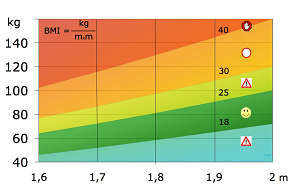
03 Mar How to reduce obesity in kids?
Love chubby babies? Who doesn’t? But, this chubbiness can kill your child.
If your child is chubby, it’s not a reason to rejoice or feel proud but to take an action as he could be overweight or obese.
Why the concern about obesity in kids? How to reduce obesity in kids?
Obese children are at a high risk of developing these health problems:
High blood pressure
Heart disease
Diabetes
Joint problems
Some cancers like endometrial, breast, and intestine
Disability
How do you define obesity in kids?
An overweight or obese child has an abnormal or excessive fat accumulation in his body.
WHO (World Health Organization) classifies obesity based on the Body mass index (BMI). It is calculated by dividing the person’s weight in kilograms with the square of his height in meters (kg/m2).

For children under 5 years:
If weight-for-height is greater than 2 standard deviations above WHO Child Growth Standards median, he is overweight.
If weight-for-height is greater than 3 standard deviations above the WHO Child Growth Standards median, the child is obese.
Causes of obesity in kids
Several factors contribute to obesity in today’s kids:
● Gestational diabetes or diabetes during pregnancy
● Increased consumption of high-fat, high-sugar, and high-salt foods
● Long-standing cultural norms that a fat baby is a healthy baby. This leads to overfeeding of the babies by their mothers
● Decreased physical activity
How can I help my obese child?.
As a parent, develop healthy eating habits in the family and encourage your child to be active. Developing healthy eating habits
● Consult your paediatrician to set a healthy weight goal for your child.
● Discuss with the family to make healthy changes for everyone including you. Kids learn from your habits.

● Start with one or two healthy habits a week instead of a complete turnover at once. Like:
Swap high-sugar beverages with water or low-fat or non-fat milk.
Give your child a healthy breakfast comprising the whole grains and protein, like a piece of whole-wheat bread with peanut butter.
Replace refined grains like white bread and white rice with whole grains
Give children fruits, vegetables, and other healthy snacks instead of chips, cookies, and candy. However, don’t offer dessert/unhealthy snacks for eating vegetables. It sends a message that vegetables are less valuable than the dessert.
Switch to healthy fats such as unsaturated oils, nut butters, and avocado.
Include carbs with a low- or medium-glycemic load, instead of the high ones. Examples are:
Low: Broccoli, carrots, avocado, apples, berries, beans, oatmeal, nuts, plain yogurt, milk, cheese
Medium: Pineapple, sweet potatoes, banana, dried fruit, pasta, high-fibre cereal, brown rice, ice-cream
High: Corn, potatoes, white rice, French fries, chips, juice, jam, sweetened yogurt, white bread, pancakes, waffles, pizza, popcorn.
Limit eating at restaurants or fast-food joints to once/twice a month.
Eat together with the family rather than in front of the television. A study shows that children who share three or more family meals a week are 20% less likely to eat unhealthy foods and 12% less likely to be overweight.
Encouraging physical activity
Children need about 60 minutes of physical activity in a day, though not all at once.
● Make exercise a family time. Go on walks or jogging together.
● Encourage your child to choose a favourite activity to do regularly, such as playing soccer, running around the playground or joining a sports team or a dance class.
● Help your child find simple and fun activities to do at home such as playing tag, jumping rope, playing catch, shooting baskets, etc.
● Limit the time with the computer, television, cell phone, and other devices to 1- 2 hours a day.
Remember, your child needs your support throughout the process of achieving a healthy weight.
Make your child feel loved, special, and important rather than ashamed of his weight. Support, understand and encourage him to achieve a healthy goal. Reward successes with praise and hugs.

No Comments